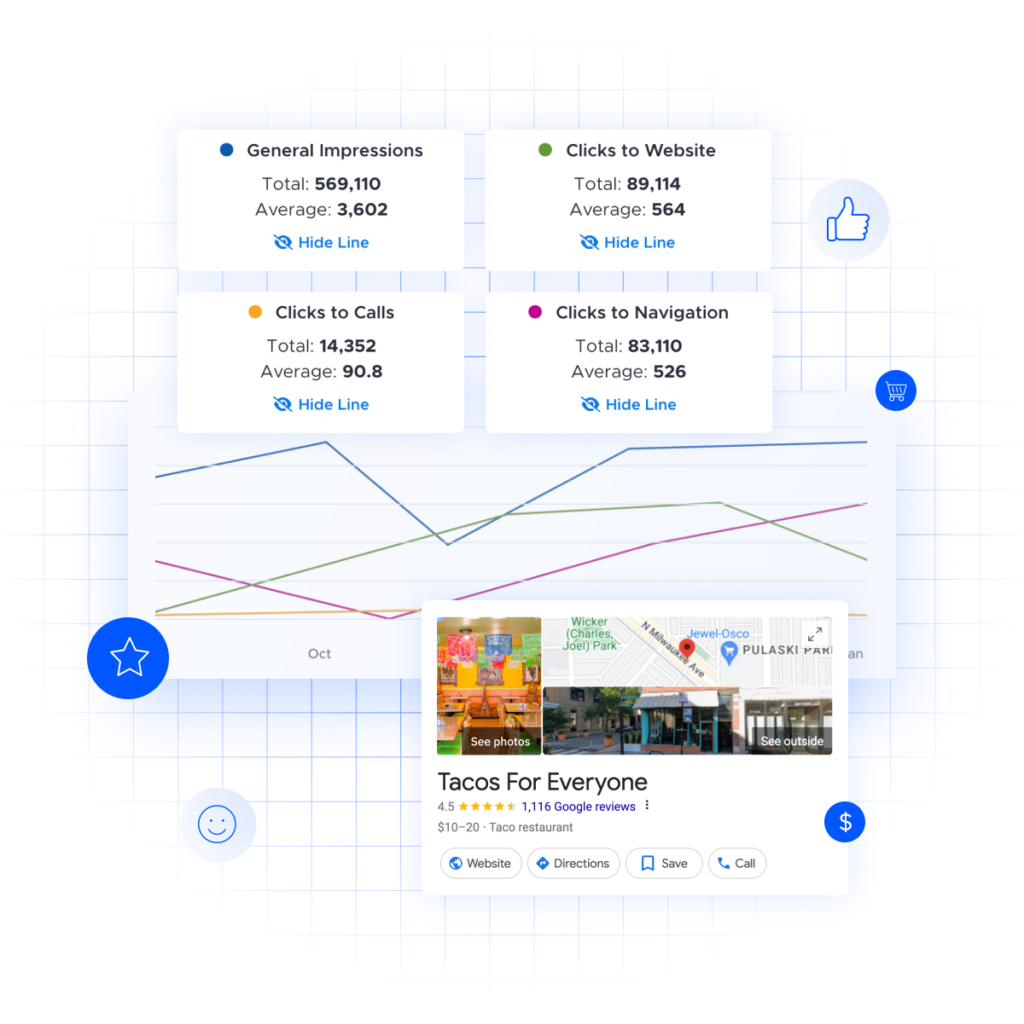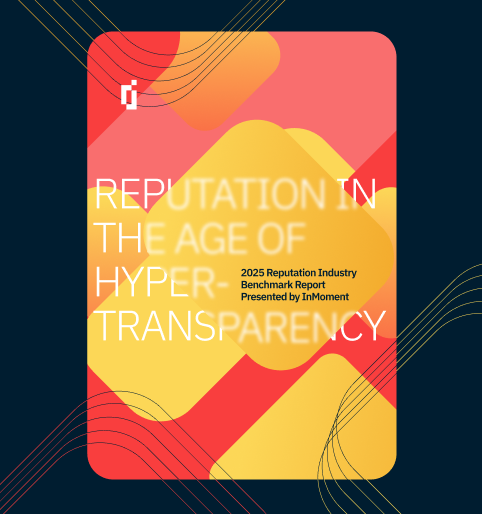Restaurant Reputation Management: Increase Diner Feedback & Demand
Reviews and ratings are the biggest drivers of spending for diners. By managing your restaurant’s reputation, you can generate more positive reviews to attract more diners, boost revenue, and stand out from the competition.
When you’re thinking of ordering takeout, or planning a date at a fancy restaurant, what’s the first thing you look at? Online reviews are the most trusted source of information for most people interacting with a restaurant for the first time. This is where restaurant reputation management can be the difference between a new client and a lost opportunity.
What is Restaurant Reputation Management?
Restaurant reputation management is the process of monitoring, responding to, and addressing feedback from various sources. Customers love talking about their experiences, especially if they had an exceptionally good or bad time. They share their thoughts on social media platforms like Facebook or Instagram or through review platforms such as Yelp and Google reviews.
The average customer sentiment across the online space contributes to the restaurant’s reputation. The more positive reviews a restaurant receives, the better the public perceives it. On the flip side, nothing affects business like negative feedback. In fact, 22% of customers will not dine at a restaurant after reading a single negative review!
To assess the current state of your restaurant’s reputation, get your personalized reputation score today! The score is calculated based on customer reviews, response rate, response time, and more. It allows you to see your overall brand health and current reputation standing.

How Reputation Management Impacts A Restaurant
Reputation management impacts a restaurant in terms of public opinion and business metrics. When you consciously manage your restaurant’s reputation, you can better control how people perceive your business. Perception is important in the digital age, where word-of-mouth spreads faster and is more impactful than ever before.
The value of customer feedback and reviews is evident from the following statistics:
- 46% of diners, representing 79 million customers, say that positive online reviews made them more likely to visit a restaurant. (PYMNTS)
- Reviews and ratings, with a share of 39%, are the biggest drivers of customer purchase and spending. (Pearl-Plaza)
- 39% of diners are extremely likely to leave a positive review after a good dining experience. (PYMNTS)
- Bad online reviews and negative feedback from friends are among the top two reasons diners avoid certain restaurants. (TouchBistro)
- 33% of customers say they will not choose a restaurant with an average three-star rating on review sites. (ReviewTrackers)
- Reviews and ratings, with a share of 42%, are the most popular way customers interact with brands. (Pearl-Plaza)
Therefore, the data suggests that online reviews are a huge factor in customers’ visiting or avoiding a restaurant. More negative reviews lead to fewer customers, which has an adverse effect on revenue, profit, and business growth.
When you think about the competitive nature of the restaurant industry, it’s clear that online reputation management is crucial for survival.
Benefits of Restaurant Reputation Management
Reputation management helps restaurants improve diner trust and business performance. Here are some of the key benefits:
- It helps restaurants attract more customers. Positive reviews and a strong online presence can draw new customers. Meanwhile, effective reputation management minimizes the impact of negative feedback.
- It results in increased revenue. A better reputation leads to more bookings and higher diner demand. These improvements drive sales and revenue.
- It boosts customer trust and loyalty. Responding to reviews and addressing customer concerns builds trust. As a result, customers are more likely to stay loyal to your brand and even advocate for it.
- It improves a restaurant’s brand image. Proactively managing your restaurant’s reputation enhances your brand image and makes your business more appealing to potential customers.
- It gives restaurants a competitive advantage. In a crowded market, a well-managed reputation helps differentiate your restaurant from competitors.
Curious about the ROI you could achieve with Pearl-Plaza’s reputation management software? Try the ROI calculator below and see the impact for yourself!
Restaurant Reputation Management Best Practices
You can’t ignore online conversations around your business. Regardless of the sentiment, it’s important to monitor and respond to reviews. The following five best practices will help you overcome challenges and provide positive customer experiences:
Monitor Online Reviews
Online reviews are a key aspect of restaurant reputation management. After all, 94% of diners choose restaurants based on online reviews. The last thing you want is to miss out on prospects simply because you haven’t been tracking your reviews.
By monitoring online reviews, you get a clearer picture of public sentiment toward your restaurant. It’s easier to plan and prioritize once you understand the general opinion around your services.
Are diners mostly satisfied with your food quality, ambiance, and wait times? What are the most common complaints, if any? Do people believe you have done enough to address these complaints? These are the kinds of questions you can answer by analyzing customer reviews.
Once you have the answers, you can set about making the necessary adjustments. Negative customer feedback highlights areas for improvement that you should prioritize. Positive feedback helps you boost your marketing efforts and showcase your restaurant in a positive light.
The Melting Pot, a fondue restaurant with over 105 locations, realized the importance of diner feedback. Through its partnership with Pearl-Plaza, it collected real-time feedback and analyzed it for deep insights into customer behavior. As a result, the restaurant improved the “speed of service” metric by 47%. It also significantly reduced time and risk in introducing new menu items.
Ask for and Respond to Reviews
Monitoring reviews is important, but it’s not enough. The next step is to address the online feedback and respond to it the right way.
Getting your review response strategy right can give you a significant competitive edge. Leaders in the restaurant industry have a response rate of 94%, while the average is 61%. Similarly, leaders have a response rate of 1.21 days, roughly half the industry average of 2.66 days.
So, how do you come up with the best possible response? It’s important to avoid sounding too general. Customers expect an empathetic reply to their feedback instead of something that feels automated. Address the feedback directly, explain why the issue occurred, and suggest specific solutions. Conclude with a note of thanks to show the customer that you always value their opinion.
Your work isn’t done with that initial response. Once you’ve made the necessary adjustments, it’s crucial to follow up with the customer. The resulting feedback loop will help you better understand your customer. Meanwhile, the customer will appreciate the follow-up and feel better about you as a brand.
As important as it is, providing a tailored response to every review can be challenging. This is where Pearl-Plaza’s reputation management software can help you win over your customers. It allows you to leverage generative AI to create responses that align with your brand’s voice guidelines. As a result, you can create and close feedback loops with ease. You also save valuable time that you can invest in other parts of your operation.
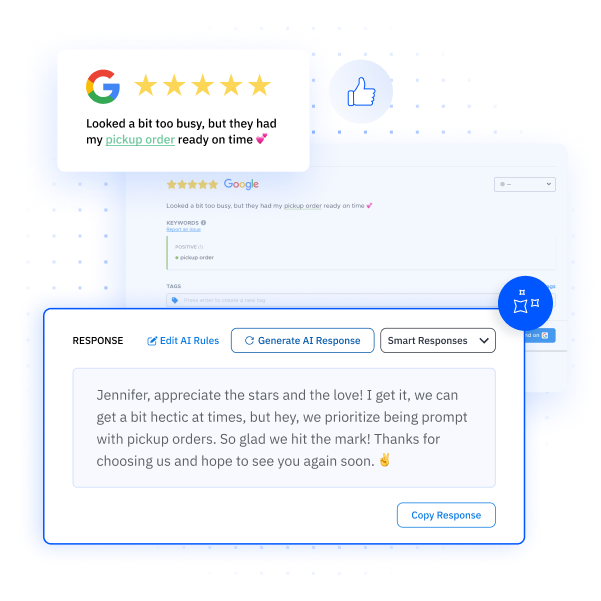
Be Active on Social Media
You can’t underestimate the importance of social media marketing for reputation management. Over 40% of diners look up a restaurant on social media before making a decision. This is because platforms like Facebook and Instagram host a ton of content from influencers and regular consumers alike.
Much of this content comprises reviews and opinions, including those on dining experiences. If your restaurant is receiving a lot of praise or criticism on social media, you need to tune in!
Start with your social media profile and look at the interactions with your recent posts. Then, search for your restaurant to see what comes up. It could be tags from food vloggers on their Stories or a post from a recent customer.
All the content related to your brand will give you a better idea of the current public sentiment. You can then craft meaningful responses where applicable to show that you’re listening and taking opinions into account.
Track Competitors’ Reputation
It’s no secret that the competition in the restaurant space is brutal. With so many trends and viral concepts emerging daily, it’s important to stay up-to-date so you don’t fall behind the pack.
Think about your biggest competitors and analyze their profiles. What are they doing right, and what mistakes are they making? What kind of reviews do they get from diners? Is there an opportunity for you to differentiate your offerings from theirs?
The insights you get from competitor analysis will help you find unique ways to win over customers to your tables.
Showcase Customer Testimonials
Positive customer testimonials are powerful marketing tools. Sharing glowing reviews or success stories builds trust and improves your brand equity. It also encourages potential customers to try your restaurant.
To showcase your strengths, highlight real experiences from happy diners through written testimonials, video reviews, or social media shoutouts.
Tips for Managing Restaurant Reputation
The following tips will help you manage your restaurant reputation for diner satisfaction and business outcomes:
Build a Consistent Experience
A restaurant experience is never just about the food. Diners want to feel welcome and comfortable throughout their journey with your restaurant.
Even if your food quality is top-notch, diners could still have mixed or negative feelings if they had to wait too long. Or, maybe they have a pleasant time talking to your staff on call, but their in-person interactions end up being the opposite.
It’s important to deliver a consistently positive customer experience across all touchpoints. From the food quality to service and ambiance, each aspect of your restaurant should satisfy customer expectations. Work with your staff across all departments to ensure everyone follows a customer-centric approach.
Develop a Crisis Management Plan
Sometimes, issues tend to crop up when you least expect it. From a diner complaint going viral to getting your account hacked, restaurants can face any number of unexpected challenges. With a crisis management plan, you can minimize the fallout from these situations.
Start by establishing communication protocols and training your staff on them. Every member needs to know the what, where, who, and how of communication during a crisis. As a result, your team will be prepared to respond when such situations arise.
Assign responsibilities so that everyone knows their role during a crisis. For example, if the CEO is occupied with a PR crisis, someone capable should be on standby to run the ship until the situation is resolved.
The goal is to manage the situation before it gets out of hand. This helps you stay in control and reduce the impact on public perception. It also allows you to turn a bad situation into an opportunity to show your dedication to customer service.
Create Location Pages
If your restaurant has multiple locations, it’s good practice to have specific location pages on your website. These pages help you connect with diners in specific regions and address their concerns.
Additionally, they contribute to local SEO, making it easier for customers to find your restaurant. Include information like hours, menus, and contact details for each location.
As a result, your business performs better across all regions. You will also be able to boost your visibility online, which brings more foot traffic through your doors.
Train Employees
Training employees to provide excellent customer service makes a huge difference. Ensure your staff understands the importance of consistency, attentiveness, and hospitality.
Regular training sessions keep staff updated on any new protocols, menu changes, or customer service strategies. This ensures they’re always prepared to offer top-tier service.
Well-trained staff can turn first-time diners into loyal customers by creating a welcoming and memorable experience.
Host Special Events
Special events and promotions are a great way to drive customer interest and boost your reputation. They help you engage the local community and show them that you’re more than just a place to dine.
For example, you could host a monthly cooking class for a reasonable fee, with a portion of the proceeds going to a local charity. An event like this helps you generate public interest in your brand, as customers love creative events that contribute to a good cause.
Features to Look For in Restaurant Reputation Management Software
Investing in the right software for restaurant reputation management simplifies the process for you and helps you boost your brand. Here are the key features to look for when choosing the right tool:
Review Monitoring and Aggregation
Diners provide reviews across the online space, from sites like Yelp to social media like Instagram. Your software should enable you to track each piece of incoming feedback so that you can respond to it swiftly and maintain your reputation.
Pearl-Plaza’s review management platform helps you monitor and connect all your review data in the most accurate and reliable way possible. As a result, you don’t miss out on any insights and can prioritize your responses accordingly.
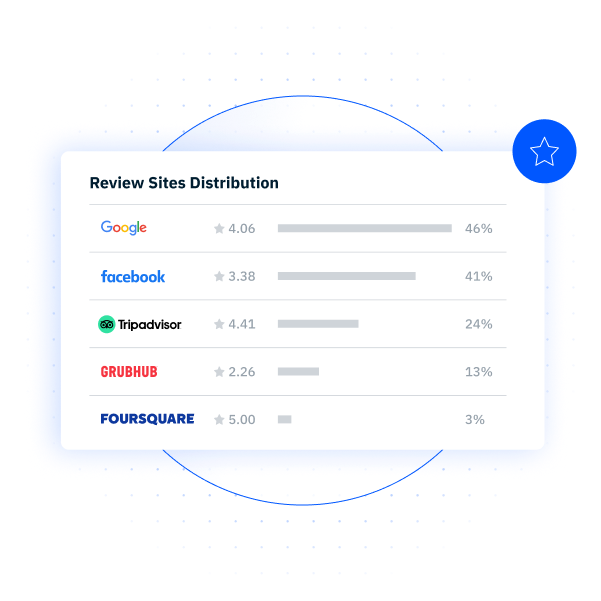
Automated Alerts
Reputation management is all about receiving feedback and acting quickly. Therefore, the right software should send automated alerts to inform you of real-time customer activity. The sooner you’re aware of a review, the quicker you can process and respond to it for effective management.
Sentiment Analysis
Tracking what your customers are saying is not enough. You need to quantify their experiences to help you better understand their overall sentiment and how you can help them. You can accomplish this with sentiment analysis, a technique that helps you capture meaning and emotion from textual reviews.
Pearl-Plaza’s sentiment analysis features empower you to gain insight into every piece of feedback you receive. The platform leverages industry-recognized metrics and real-time intelligence gathering to help you better understand customer opinion.
By removing guesswork from the process, the right software can save you valuable hours with analytical insights into customer behavior.
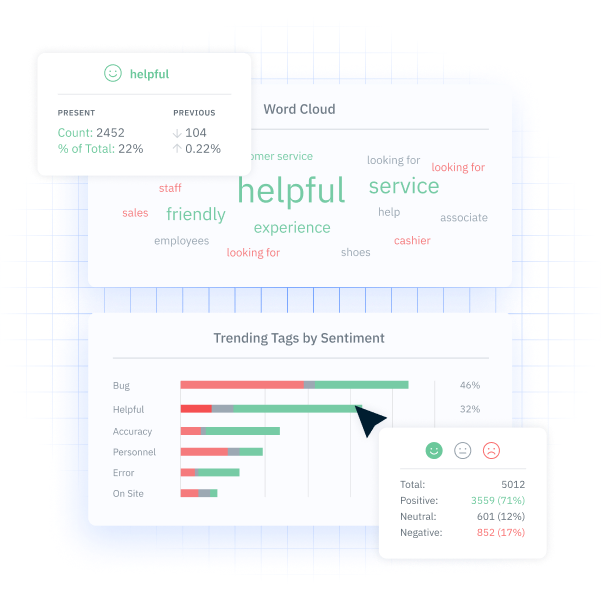
Review Response Templates
Not sure about the right response for diner satisfaction and issue resolution? A good reputation management software can solve this headache with review response templates. These templates can help you generate quick and effective responses to feedback while reflecting your unique brand voice.
Social Media Management
Without managing your social media presence, you’re at risk of missing out on vital insights. Your software of choice should help you track customer interactions across platforms like Facebook, Instagram, and X.
Pearl-Plaza enables social media management for businesses with content scheduling and curation. It also leverages AI and sentiment analysis to track keywords and brand mentions so that you can stay on top of conversations around your restaurant.
Competitor Comparison
Understanding how your competitors are performing is key to staying competitive. Look for software that includes competitor comparison tools, which allow you to monitor their reviews, ratings, and feedback.
Pearl-Plaza’s reputation management platform gives you access to competitor analysis software to capture key insights for staying ahead of the pack. It helps you identify competitors, see how you rank against them, and set alerts to stay informed on performance changes. As a result, you stay in the loop and can refine strategy where necessary.
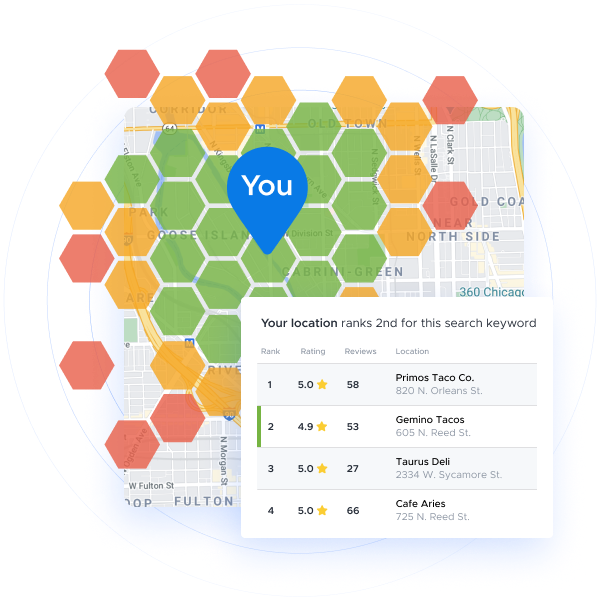
Local Listings Management
Inaccurate and inconsistent business information across your listings can turn away customers. For example, a change in business hours or branch location that is not reflected in your listings will confuse diners. This can hurt your credibility as a brand. Therefore, your software should help you manage your listings to boost visibility and attract more customers.
Pearl-Plaza’s local listings management software lets you decrease ad spend by making the most of your local listings. The tool gives you insight into your local reputation by offering ROI-specific insights from your Google Maps listings. You can use the information to increase your influence, outrank competitors, and create relevant Google posts to drive organic sales.
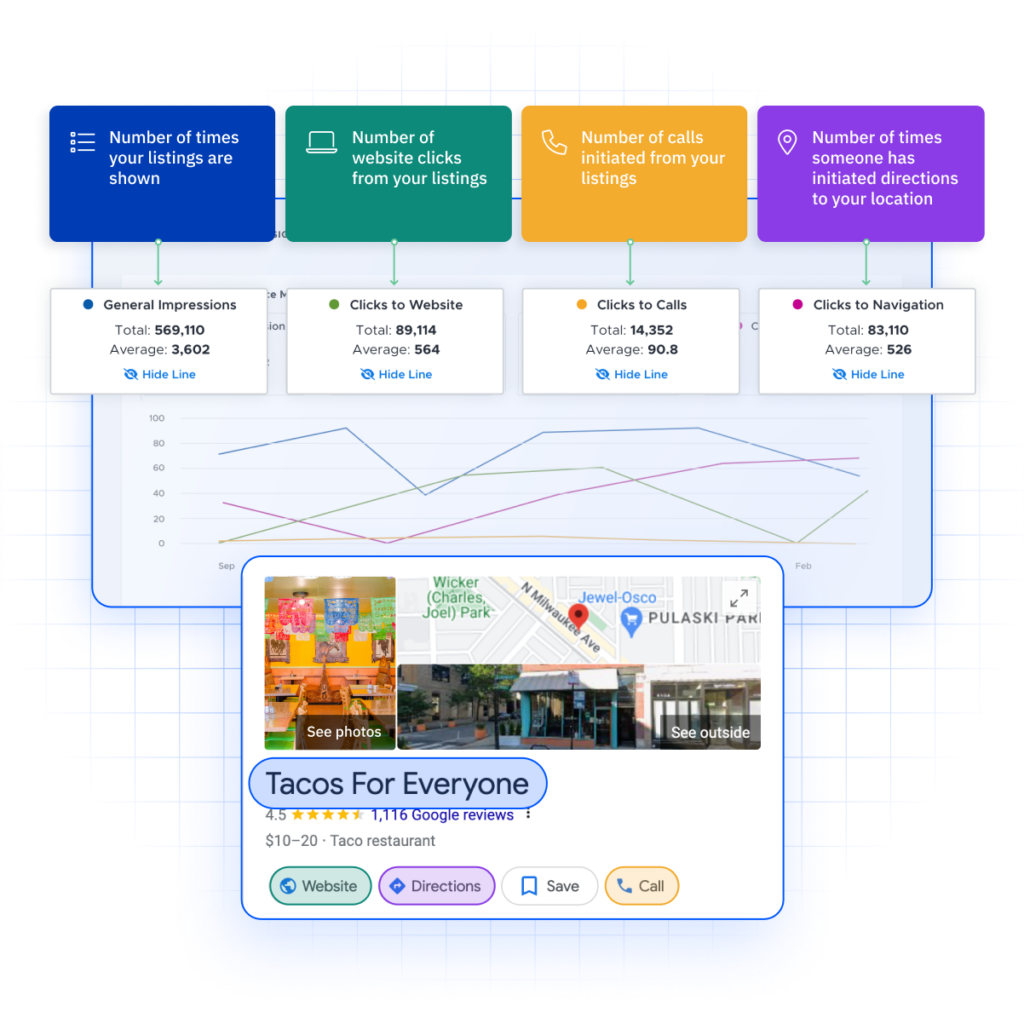
Survey Tools
Surveys are tried-and-tested means of feedback collection that can help you better understand your diners. The right software should feature survey design tools to help you gather consistent insights.
Pearl-Plaza’s XI Platform gives you the ability to build surveys from scratch or choose from pre-built templates. As a result, you collect actionable feedback quicker, which helps you improve diner satisfaction.
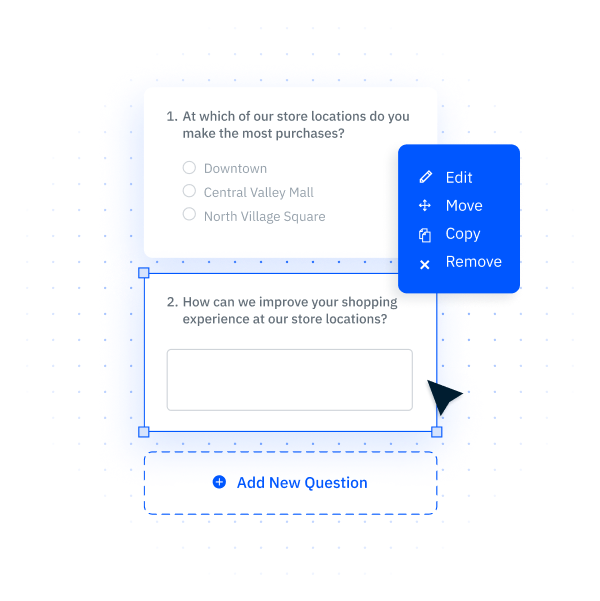
Integration with Reservation Systems
Your reputation management software should integrate seamlessly with your reservation or point-of-sale systems. This feature allows you to link reviews directly to specific customer interactions. It also enables automated survey requests that you can send once a reservation is complete. Therefore, you can seamlessly collect feedback and determine areas for improvement.
Review Generation
Review generation tools boost your online reputation by requesting feedback from satisfied diners. The software you choose should allow you to send requests that prompt customers to leave reviews after their dining experience. Since the process is automated, you can request and collect reviews with ease to enhance ratings and credibility.
Improve Restaurant Reputation Management with Pearl-Plaza
Your restaurant could have the best chefs and attention to detail when it comes to food. But, without robust reputation management, you’ll struggle to differentiate yourself and keep diners coming through your doors.
With Pearl-Plaza, you get access to award-winning reputation management software that helps you consistently win over customers and boost your brand. Schedule a demo today to see how you can stand out and stay ahead!
References
WOWAPPS. How Restaurant Reviews Impact People’s Decisions (https://www.wowapps.com/how-restaurant-reviews-impact-peoples-decisions). Accessed 10/21/2024.
PYMNTS. Everyone’s a Critic: 49M Consumers Recently Posted Online Restaurant Reviews (https://www.pymnts.com/restaurant-innovation/2023/everyones-a-critic-49m-consumers-recently-posted-online-restaurant-reviews). Accessed 10/21/2024.
Pearl-Plaza. Restaurant Consumer Trends Report (/wp-content/uploads/2023/03/RP-02389-03-NA-2023-Food-Service-Restaurant-Trends-Report.pdf). Accessed 10/21/2024.
TouchBistro. 2024 Dining Trends Report: The Latest Restaurant Industry Trends (https://www.touchbistro.com/blog/diner-trends-report). Accessed 10/21/2024.
ReviewTrackers. Powerful Restaurant Reputation Management in 5 Steps (https://www.reviewtrackers.com/blog/restaurant-reputation-management). Accessed 10/21/2024.


